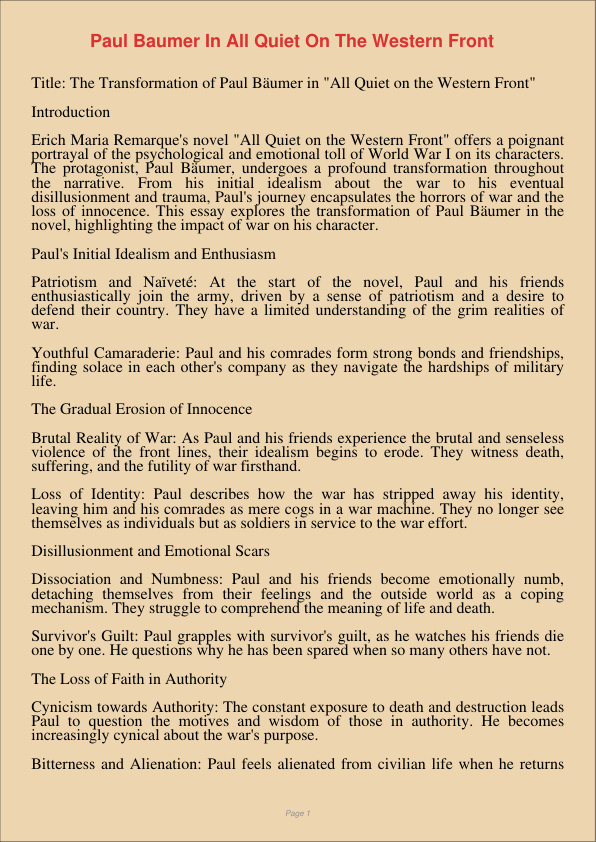Paul Baumer In All Quiet On The Western Front
Jan 12, 2024
western front
paul baumer
Environmental Studies
Sociology
Title: The Transformation of Paul Bäumer in “All Quiet on the Western Front”
Introduction
Erich Maria Remarque’s novel “All Quiet on the Western Front” offers a poignant portrayal of the psychological and emotional toll of World War I on its characters. The protagonist, Paul Bäumer, undergoes a profound transformation throughout the narrative. From his initial idealism about the war to his eventual disillusionment and trauma, Paul’s journey encapsulates the horrors of war and the loss of innocence. This essay explores the transformation of Paul Bäumer in the novel, highlighting the impact of war on his character.
Paul’s Initial Idealism and Enthusiasm
Patriotism and Naïveté: At the start of the novel, Paul and his friends enthusiastically join the army, driven by a sense of patriotism and a desire to defend their country. They have a limited understanding of the grim realities of war.
Youthful Camaraderie: Paul and his comrades form strong bonds and friendships, finding solace in each other’s company as they navigate the hardships of military life.
The Gradual Erosion of Innocence
Brutal Reality of War: As Paul and his friends experience the brutal and senseless violence of the front lines, their idealism begins to erode. They witness death, suffering, and the futility of war firsthand.
Loss of Identity: Paul describes how the war has stripped away his identity, leaving him and his comrades as mere cogs in a war machine. They no longer see themselves as individuals but as soldiers in service to the war effort.
Disillusionment and Emotional Scars
Dissociation and Numbness: Paul and his friends become emotionally numb, detaching themselves from their feelings and the outside world as a coping mechanism. They struggle to comprehend the meaning of life and death.
Survivor’s Guilt: Paul grapples with survivor’s guilt, as he watches his friends die one by one. He questions why he has been spared when so many others have not.
The Loss of Faith in Authority
Cynicism towards Authority: The constant exposure to death and destruction leads Paul to question the motives and wisdom of those in authority. He becomes increasingly cynical about the war’s purpose.
Bitterness and Alienation: Paul feels alienated from civilian life when he returns on leave. He struggles to relate to the people who remain ignorant of the war’s horrors and the sacrifices made by soldiers.
Conclusion
Paul Bäumer’s transformation in “All Quiet on the Western Front” serves as a powerful depiction of the psychological and emotional toll of war. From his initial idealism as a young soldier to his eventual disillusionment, emotional scars, and cynicism, Paul’s journey reflects the broader experiences of those who lived through the horrors of World War I. Remarque’s novel reminds us of the devastating impact of war on the human spirit, emphasizing the need to strive for peace and understanding in a world marked by conflict and violence.
